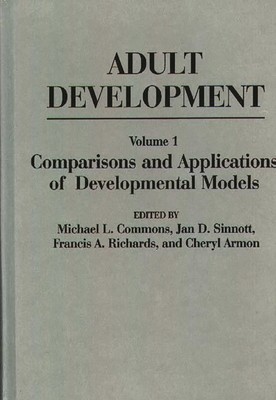
- We will send in 10–14 business days.
- Publisher: Praeger
- ISBN-10: 0275927482
- ISBN-13: 9780275927486
- Format: 15.6 x 23.4 x 2.1 cm, hardcover
- Language: English
- SAVE -10% with code: EXTRA
Adult Development (e-book) (used book) | bookbook.eu
Reviews
Description
In recent years, a number of researchers have begun to question the Piagetian theory that cognitive structural development ends with the adolescent's acquisition of formal operations and have begun to focus on the development of thought in late adolescence and adulthood. This volume brings together the work of numerous scholars in cognitive social, and perceptual development to explore the nature of postformal thought. The contributors represent the diversity of models and approaches that characterize the ongoing research in this area and, at the same time, act to unify this body of literature within a common framework of analysis. Students, researchers, and practicing psychologists will find her important new insights into the evolution of thought processes throughout the human lifespan.
A number of the papers present alternative, but closely related models of postformal cognition, as well as techniques of measuring postformal thought. Of special interest is the presentation of data supporting claims that thought represents a stage qualitatively distinct from the transition between hierarchical and formal operations. The opening chapter describes Beethoven's cognitive development in late adolescence and adulthood, while subsequent essays discuss the modifications of formal structures that develop in the attempt to use formal reasoning in real-life problem solving. A set of studies that extend the study of postformal thought into the domains of moral thought and social reasoning complete the volume.
EXTRA 10 % discount with code: EXTRA
The promotion ends in 19d.23:13:57
The discount code is valid when purchasing from 10 €. Discounts do not stack.
- Publisher: Praeger
- ISBN-10: 0275927482
- ISBN-13: 9780275927486
- Format: 15.6 x 23.4 x 2.1 cm, hardcover
- Language: English English
In recent years, a number of researchers have begun to question the Piagetian theory that cognitive structural development ends with the adolescent's acquisition of formal operations and have begun to focus on the development of thought in late adolescence and adulthood. This volume brings together the work of numerous scholars in cognitive social, and perceptual development to explore the nature of postformal thought. The contributors represent the diversity of models and approaches that characterize the ongoing research in this area and, at the same time, act to unify this body of literature within a common framework of analysis. Students, researchers, and practicing psychologists will find her important new insights into the evolution of thought processes throughout the human lifespan.
A number of the papers present alternative, but closely related models of postformal cognition, as well as techniques of measuring postformal thought. Of special interest is the presentation of data supporting claims that thought represents a stage qualitatively distinct from the transition between hierarchical and formal operations. The opening chapter describes Beethoven's cognitive development in late adolescence and adulthood, while subsequent essays discuss the modifications of formal structures that develop in the attempt to use formal reasoning in real-life problem solving. A set of studies that extend the study of postformal thought into the domains of moral thought and social reasoning complete the volume.


Reviews